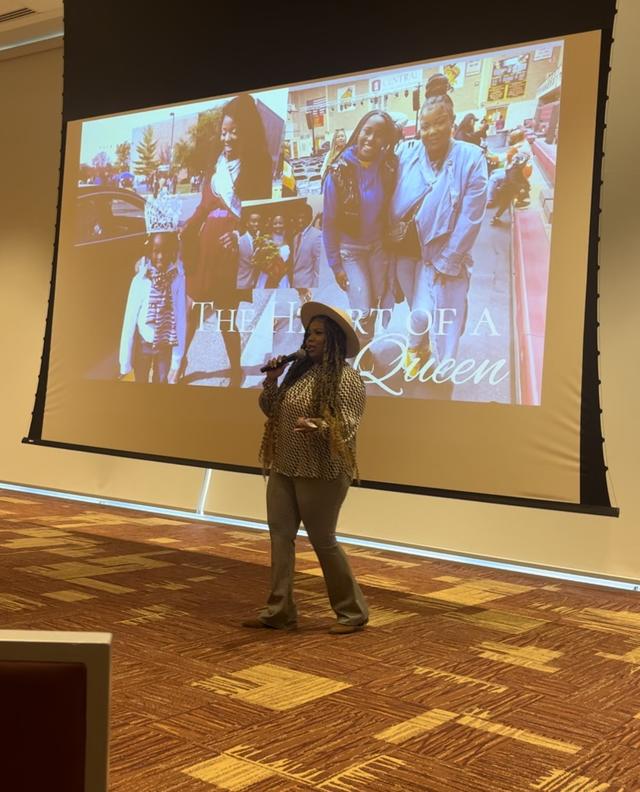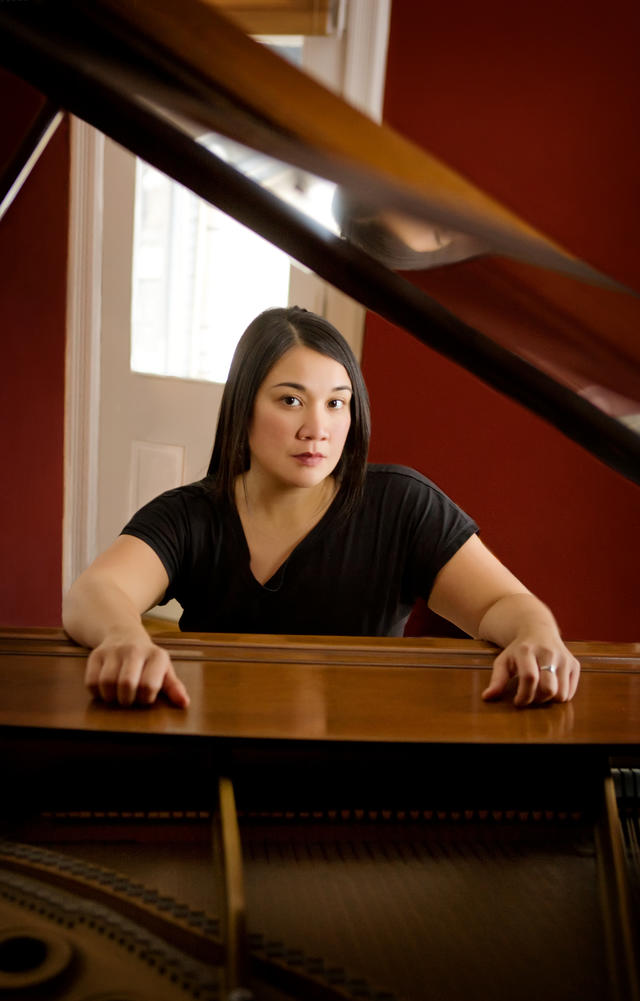
From residence hall coordinator to singer-songwriter: College mentor gives back to her HBCU

In the latest edition of The People of CSU, we catch up with the 2012-13 Miss Central State University, Teeya Skipper (above, second from right), '13, who returned to her alma mater to give to students like those mentors who supported her.
Teeya Skipper fills many roles — singer-songwriter, producer, motivational speaker, content creator, entrepreneur, mentor, and former Miss Central State University. Her passion for connecting with people personally has led to a relatively new title: residence hall coordinator at Anne O'Hare Williamson Hall.
The Centralian came to Central State in 2009 and graduated in May 2013 with a Bachelor of Arts in Music Performance and concentrations in classical music and voice.

Central State University played a pivotal role in shaping Skipper’s career. As a student, she was part of the Grammy-nominated CSU Chorus, which opened doors for her to travel the world, including a memorable nine-day trip to China. She also secured music gigs throughout Dayton. Reflecting on her time at CSU, she said, “It was such a rich experience.”
Additionally, Skipper was a member of Mu Phi Epsilon, a co-educational International Professional Music Fraternity. She was named to the dean's list, served as a resident advisor, and hosted some of the most popular events on campus — weekly open mic nights that packed Jane Hunter Hall.
Skipper had set her sights on Atlanta, ready to pursue her dreams of becoming a professional musician and music producer. Her determination paid off almost immediately. After moving to Atlanta in November 2013, she made her mark in major production plays, later appearing on the reality show "Love & Hip Hop Atlanta," launching her own vocal coaching studio, and releasing her first album.
Skipper’s roots as a public speaker go back to her time as the 2012-13 Miss Central State University queen. The Chicago native said she is grateful a friend convinced her to enroll at CSU when she wasn’t even considering college.
“I had no idea how much my life was going to change here and what academics and leadership would mean to me,” Skipper said.
Returning for the 2022 Homecoming festivities and the 75th anniversary of the first crowning of Miss Central State University, Skipper reconnected with one of her mentors, Justyn Fry, director of Residence Life.
“There were queens whose pictures were in black and white, queens who still had (personal) stories of segregation. I was so humbled,” Skipper said.
Realizing how much grace and love others had poured into her, Skipper, half-jokingly, asked Fry if he was hiring. She had been her own boss, a full-time artist in Atlanta, for almost a decade. But she began to wonder whether she wanted to return to her alma mater.

“A month later, there was an opening for the hall coordinator for Williamson Hall,” Skipper said. “I said, ‘OK, I’m going to come back and give back what I was given — guidance, a hard talking to, structure, a chance.’
“These were not people who were blood or kin to me. These were strangers who were my teachers, who took on the role of advisor and mentor. Their guidance steered my life. ... Central State has some fierce alumni who have helped me, too. When you care about the place that you know you got so much from, it feels like you owe it to give it back.”
The impact of her time at Central State is evident in her daily life as a creative visionary.
“Even when I was so close to giving up, I had reinforcement on every side,” Skipper recalled. “How could I not make sure that I was that bumper rail for another (student) here?”
Building confidence as a Marauder
Skipper said faculty members forever changed her life during her undergraduate years. They included Dr. Jenny Cruz, current chair of the Department of Fine Arts and a professor of music; William Henry Caldwell, former director of the CSU Chorus; Lee Hoffman, a professor of voice who also served as Skipper’s voice coach during all four years at CSU; and Dr. Lennard Moses, another professor of music.
Before speaking about Hoffman, Skipper grabbed a tissue and took a deep breath.
“When I look back on when I came to Central, it feels like everything was so aligned,” she said. “I had the right people at the right time for exactly what I needed.
“There was a period of time where I was really struggling with seeing myself how my teachers saw me based on the limited life I had experienced and what I thought I knew about myself."
"Wrestling with that looked like, I’m doing well in school, but I’m depressed. I’m passing my classes, but I’m not leaving my room. (Hoffman) started to notice that I was ebbing and flowing, high and low. ... I would be going hard in class and school and leadership, and then I would feel like I hit a wall, and I couldn’t get out of bed.”
First, Hoffman gently told Skipper that there was no shame in taking medicine for mental health if that’s what she wanted to do. Later, Hoffman referred Skipper to Counseling Services to speak with a therapist.
“I needed that,” Skipper said. “With Professor Hoffman, she not only guided me to the care that I needed ... she never tried to change my voice. She pushed me to not just lean on things I knew I could already do. She saw certain parts of my voice that I would try to hide away, and she would pick songs specifically that would spotlight that area.
“The same thing I was experiencing with my voice, I was experiencing as a person. I would think, ‘I want to just do what I’m good at because I know people will clap for that. But if I expose a part of my voice that’s not as good or that still seems very childlike, that’s not special, and people don’t want that.’”
Hoffman was a “phenomenal soprano” and mentor, Skipper said.
“You can’t teach voice without teaching the person because the voice is in the body," Skipper said. “Sometimes I did feel like, how am I ever going to rise to that? But they were right about me. I wasn’t. It just felt good to have instructors who, in moments of weakness, all I could do was trust that they were right. And they were. They changed my life.”
Skipper described Cruz as a no-nonsense person who taught the value of being disciplined. As a first-year student, Skipper heard from upper-level students that many failed Cruz’s tough music theory course and needed to retake it.
“I was like, ‘I gotta get out of here. This is not for me,’” Skipper recalled. “I’ve never gone to a music school. So, I’m thinking, ‘If they went to music school and they’re failing, this is their fourth time taking this class? I have no chance.’”
Skipper went to Cruz’s office before classes began, seeking permission to drop the course.

"She turns around in her chair and says, ‘So you can what? ... Why do you want to be dropped from my class?’ This is not how it was supposed to go! I didn’t know (she) was going to ask me a question. You’re just supposed to sign the sheet!”
Skipper told Cruz everyone was telling her that the course was extremely challenging.
“She was like, ‘Have you ever done anything hard in your life?’ ... I was so shocked,” Skipper said. “And (Cruz) was like, ‘Well, this will be one of them. I’m not dropping you from my class.’ ... I remember walking out of her office wondering, ‘What am I going to do now?’”
But Skipper had another challenge to overcome — she could not afford the textbook and began turning in assignments on photocopied pages.
“(Cruz) would start writing on my assignment, ‘Why is this photocopied?’ I was like, ‘I’m not going to answer that. Hopefully, she’ll forget.’ So, one day, Dr. Cruz did not play,” Skipper recalled. “She asked, ‘Why are these photocopied?’ She was strict. She was like, ‘You need to have this book,’ but I couldn’t afford it. ... I know some students want to use their (financial aid) refund check to shop; they don’t want to take care of business. But I genuinely could not afford it.
“In the moment, she was like, ‘If you don’t get this book, I’m going to have to drop you from my class.’ I remember telling her — and I was shaking in my boots because I was scared — I said, ‘Dr. Cruz, I have an A in your class. A person who has an A is not someone who’s just trying to get by. I tried to drop this class. I tried to walk away, and you gave me the courage to stay. Now you’re going to put me out?’”
When Skipper returned to class the following day, she found a workbook on her desk. Cruz told her she had until the end of the semester to pay her back. Skipper went on to make her professors proud, never failing a course.
“That’s what my teachers saw that I didn’t see,” Skipper said, reaching for a tissue as her voice cracked. “That I had it, and I didn’t even know. I was looking at the judgment I was experiencing from other people who came from these prestigious schools and musical backgrounds. I didn’t realize that music wasn’t in my background in schooling — it was in me. I come from a family full of singers. ... I have so much of it in me that I didn’t know it would matter as much and that I would be able to contend with those who felt that they were better because they had the schooling.
"What ended up happening was, here’s a girl from Chicago who didn’t seem like a threat at all, who surpassed everyone who thought that they had it in the bag because of what they came from."
"If it had not been for the teachers and mentors, I would not have had the strength to believe that I could be who I turned out to be.”
In her position as residence hall coordinator, Skipper can empower today's students just as those who came before her inspired her.


